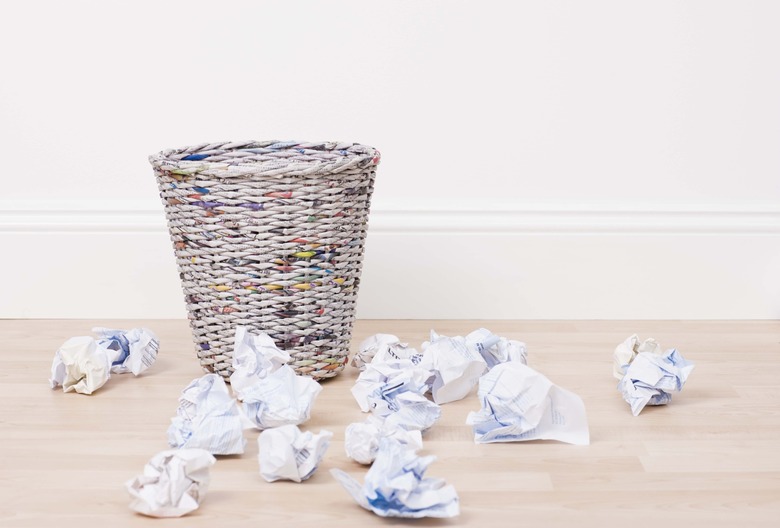Five Reasons Why Littering Is Bad
Not all trash ends up in trash cans. When you walk on a sidewalk, you may see candy wrappers, cigarette butts and soda cans littered along the path. You may also see litter in city, state, or national parks, along trails and in parking lots. Not only does littered trash make urban and natural places less attractive, but litter has negative impacts for humans, wildlife and the environment.
Impact on Wildlife
Impact on Wildlife
There's more than one way that litter is hazardous to wildlife. Animals can get their heads stuck in jars or cups that smell like food. If they can't get the container off of their head, they may suffocate or starve to death. Broken glass can lead to cuts that may get infected. Animals can also get stuck inside of plastic bags or plastic six-pack rings and get tangled in string or netting.
Eating litter can also lead to extreme illness or death in wildlife. Household waste, cleaners, plastic and latex that get mistaken for food can make animals sick or could be toxic. Litter along roads is also dangerous for wildlife. If food scraps are discarded outside of a car window, birds or other animals may scavenge too close to the road and get hit by a vehicle.
Costs of Cleaning Up
Costs of Cleaning Up
One of the biggest problems with littering is how much money it costs to clean up. A study released in 2020 found that the city of Philadelphia, Pennsylvania, spends more than $48 million cleaning up and preventing litter each year. Many cities have street sweeping programs that keep streets clear of trash and prevent litter from entering storm water drains.
Human Health and Safety
Human Health and Safety
Litter has negative impacts on human safety, too. In oceans, discarded plastic litter can reduce tourism, hinder commercial and recreational fishing, and threaten human health. Scuba divers could become entangled in nets, or beach visitors may step on sharp debris. Medical waste, like hypodermic needles, is a high concern because it can spread infections and disease.
Lines and nets can also interfere with navigation if they become wrapped around boat propellers and motors. These lost nets can also kill fish, a process known as "ghost fishing." In Puget Sound, it was estimated that lost crab pots capture around 200,000 pounds of crab annually. This reduces economic opportunity for commercial and recreational fishing.
Environmental Contamination
Environmental Contamination
Other negative effects of littering include fire hazards and habitat contamination. Tobacco products make up more than one third of existing litter. If a lit cigarette is dropped onto the ground, it can cause a forest fire. Cigarettes are also full of toxic chemicals such as cadmium, lead and arsenic, which can contaminate the surrounding environment. If children or animals find and eat cigarette butts, they can be poisoned.
Many types of litter take years to break down, if they do so at all. Aluminum cans could last more than 100 years in a landfill. When litter becomes part of the environment, it contaminates habitats for plants and animals. Chemicals from litter can poison soil, and polluted water and metals can also leach into groundwater supplies.
Impact on Ocean Wildlife
Impact on Ocean Wildlife
In the oceans, plastic is a leading form of litter. In 2015, National Geographic reported that there were 5.25 trillion pieces of plastic debris in the ocean at that time. Plastic can absorb toxic chemicals from the environment and transport them to other environments as currents move the plastic. To make plastics stronger and more flexible, they often have additives that extend the life of the plastic. Ultraviolet radiation and weathering break plastic down into smaller particles called _microplastics._ These pieces are then ingested by seabirds, fish, and whales, and have been found in more than 100 aquatic species.
More than 85% of the world's plastic is not recycled, so recycling your plastics at home is one way you can help prevent plastic from entering the ocean. We can also do our part to reduce the amount of single-use plastic we use in the products we buy.
Cite This Article
MLA
Taylor, Lindsey. "Five Reasons Why Littering Is Bad" sciencing.com, https://www.sciencing.com/five-reasons-why-littering-is-bad-13407077/. 30 September 2021.
APA
Taylor, Lindsey. (2021, September 30). Five Reasons Why Littering Is Bad. sciencing.com. Retrieved from https://www.sciencing.com/five-reasons-why-littering-is-bad-13407077/
Chicago
Taylor, Lindsey. Five Reasons Why Littering Is Bad last modified March 24, 2022. https://www.sciencing.com/five-reasons-why-littering-is-bad-13407077/
